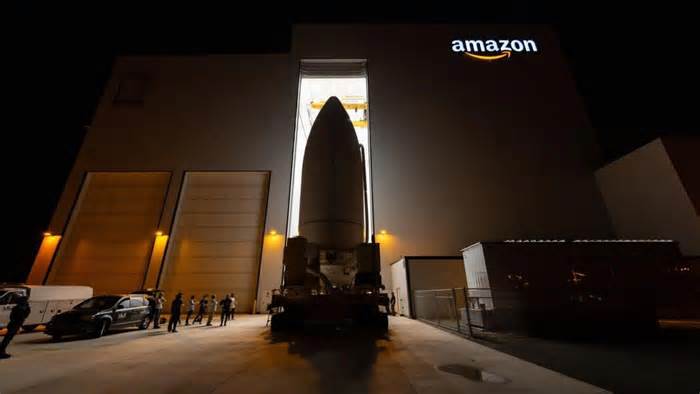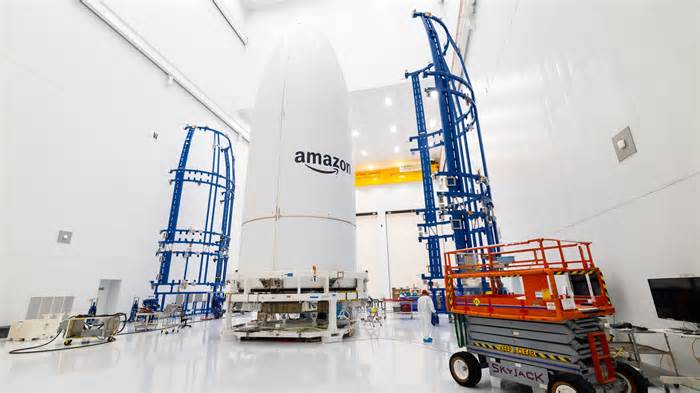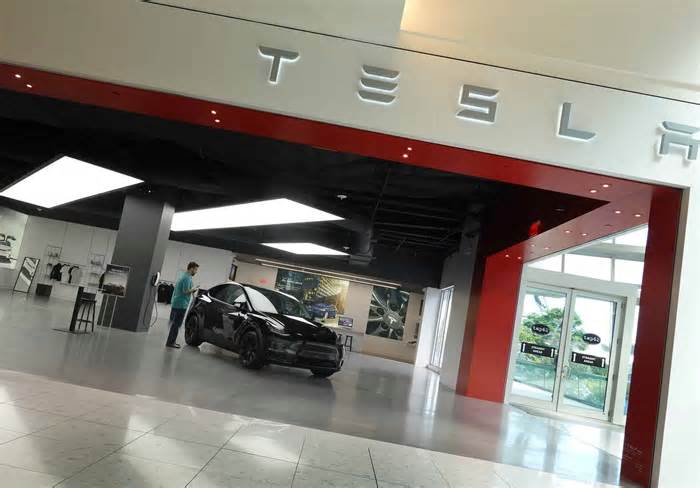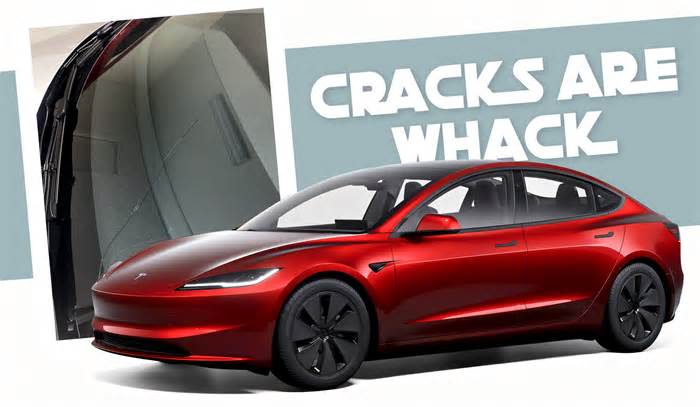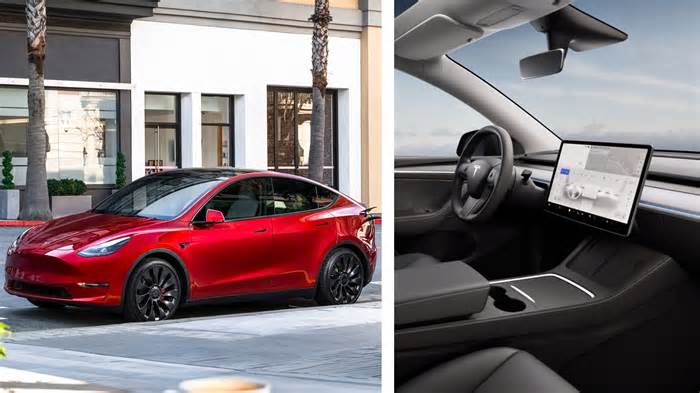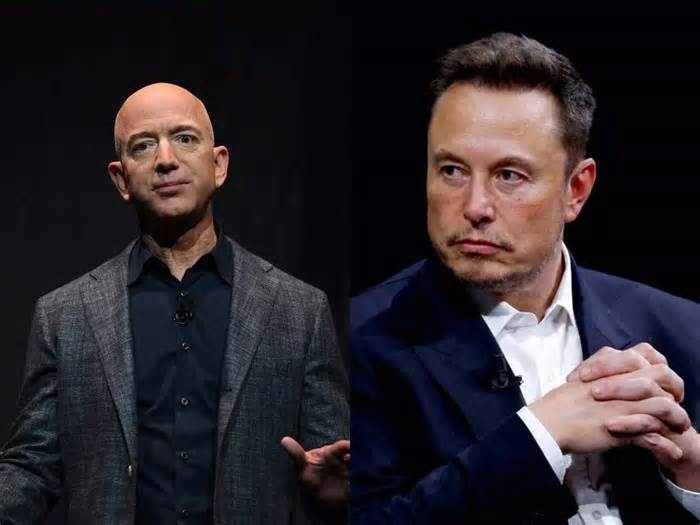
Trump's changes to a $42 billion broadband program could be a win for Musk's Starlink
- by Jefferson Public Radio
- Apr 01, 2025
- 0 Comments
- 0 Likes Flag 0 Of 5
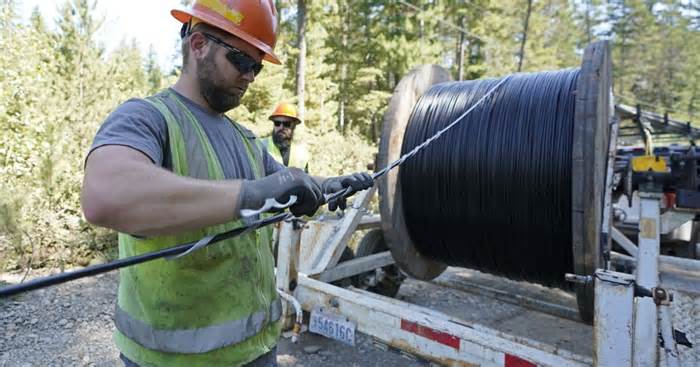
/ AP
In this 2021 file photo, a worker with the Mason County Public Utility District in Washington state installs a hanger onto fiber-optic cable as it comes off of a spool.
After years of planning, the Trump administration is overhauling a federal universal broadband initiative to open the door to Elon Musk's Starlink satellite service.
Updated April 01, 2025 at 05:00 AM ET
West Virginia Gov. Patrick Morrisey last week unveiled a shake-up to a federally subsidized broadband program that gained little notice. That came as no surprise. It sounded like an unremarkable announcement about a government project receiving an extension.
But below the surface, the news marked the first instance of a state taking action at the direction of the Trump administration to upend a multi-billion-dollar pool of money to potentially benefit White House adviser Elon Musk.
For the past four years, states including West Virginia have been working with the federal government to finalize plans to extend underground fiber-optic cables to the estimated 22 million Americans without at-home internet.
But the Trump administration is overhauling the $42 billion federal grant program known as Broadband Equity, Access and Deployment Program to be "tech neutral," meaning open to satellite internet service. This comes despite telecommunications experts insisting that fiber is the fastest, more affordable way to connect underserved communities.
Republicans in Washington counter that companies including Musk's Starlink satellite company were excluded from the grants under former President Joe Biden. And the program's redesign is aimed at fixing that. In the eyes of Democrats and Musk critics, the push from the White House looks like a handout to the tech mogul.
West Virginia, in its announcement, said White House officials have given the state 90 days to evaluate the most efficient ways to connect residents in remote areas with fast internet service, including satellite options.
Morrisey's office did not respond to a request for comment from NPR.
To Evan Feinman, who ran the federal broadband grant program in the Commerce Department under Biden, the move makes little sense.
"West Virginia was ahead of schedule, under budget and ready to provide excellent connections for every West Virginian home and business. How can anyone go back and say, 'Let's go back to the drawing board'?" said Feinman, who stepped down from his role running the broadband initiative earlier this month.
"It's hard to identify any sensible case for upending these plans based on the technology or the economics," Feinman said.
Telecom expert: How much money will Musk get?
The Broadband Equity, Access and Deployment Program, also known as BEAD, which was authorized by Congress when lawmakers passed the 2021 infrastructure bill, has received blowback from many corners over its slow pace.
When President Trump went on the Joe Rogan podcast just before the November election, the two shared a moment expressing shock that BEAD has not yet connected a single household.
Had Musk's Starlink been tapped to connect those without high-speed internet access, he could've had it done already, Rogan said. "He wanted to do that," Trump added, referring to Musk.
So when Commerce Secretary Howard Lutnick announced earlier this month that the Trump administration would be revamping the program, industry experts believed this was a gift to Musk.
"How much money can he get? How much money can he prevent a competitor from getting?" said Blair Levin, a telecom policy analyst at the Brookings Institution. "If the decision is made on the basis of politics, it will cost the country for decades to come."
That's because traditional fiber broadband, Levin said, is speedier, cheaper and generally more stable than satellite internet like Starlink. He said satellite service is quite effective for households in remote areas with no other options.
"Satellite internet is like a dirt road, fiber internet is like a highway," said Drew Garner with the Benton Institute for Broadband & Society. "You can build a few houses off a dirt road, but you can build hospitals, schools, businesses and entire cities off a highway."
Starlink, which is owned by Musk's SpaceX, is a system that uses a small antenna atop a house to connect to a constellation of satellites in orbit.
A Starlink plan comparable to high-speed fiber service is about $120 a month, with the hardware costing about $400. Because of the cost of setting up a satellite network, there are only a handful of serious rivals, none of which have had Starlink's focus on the consumer market.
Scott Olson / Getty Images
Please first to comment
Related Post
Stay Connected
Tweets by elonmuskTo get the latest tweets please make sure you are logged in on X on this browser.
Sponsored
Popular Post
tesla Model 3 Owner Nearly Stung With $1,700 Bill For Windshield Crack After Delivery
35 ViewsDec 28 ,2024






 Energy
Energy




